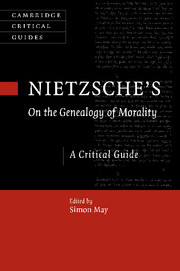Book contents
- Frontmatter
- Contents
- Contributors
- Acknowledgements
- Note on texts, translations, and references
- Introduction
- Chapter 1 The future of evil
- Chapter 2 On the nobility of Nietzsche’s priests
- Chapter 3 The genealogy of guilt
- Chapter 4 Why Nietzsche is still in the morality game
- Chapter 5 Who is the “sovereign individual”? Nietzsche on freedom
- Chapter 6 Ressentiment and morality
- Chapter 7 The role of life in the Genealogy
- Chapter 8 The relevance of history for moral philosophy
- Chapter 9 Why would master morality surrender its power?
- Chapter 10 “Genealogy” and the Genealogy
- Chapter 11 The promising animal
- Chapter 12 Nietzsche and the “aesthetics of character”
- Chapter 13 Nietzsche and the virtues of mature egoism
- Chapter 14 Une promesse de bonheur? Beauty in the Genealogy
- Bibliography
- Index
Chapter 5 - Who is the “sovereign individual”? Nietzsche on freedom
Published online by Cambridge University Press: 05 November 2011
- Frontmatter
- Contents
- Contributors
- Acknowledgements
- Note on texts, translations, and references
- Introduction
- Chapter 1 The future of evil
- Chapter 2 On the nobility of Nietzsche’s priests
- Chapter 3 The genealogy of guilt
- Chapter 4 Why Nietzsche is still in the morality game
- Chapter 5 Who is the “sovereign individual”? Nietzsche on freedom
- Chapter 6 Ressentiment and morality
- Chapter 7 The role of life in the Genealogy
- Chapter 8 The relevance of history for moral philosophy
- Chapter 9 Why would master morality surrender its power?
- Chapter 10 “Genealogy” and the Genealogy
- Chapter 11 The promising animal
- Chapter 12 Nietzsche and the “aesthetics of character”
- Chapter 13 Nietzsche and the virtues of mature egoism
- Chapter 14 Une promesse de bonheur? Beauty in the Genealogy
- Bibliography
- Index
Summary
Most readers of Nietzsche’s On the Genealogy of Morality over the last century would, one suspects, be astonished to discover the prominence recent scholarship has given to the enigmatic figure of the “sovereign individual,” who appears just once, in section 2 of the second essay (GM, II, 2), and never appears again, in the Genealogy or indeed anywhere else in the corpus. Yet according to Keith Ansell-Pearson, for example,
The overriding aim of the Genealogy of Morals is to show that what Kant and the modern liberal tradition of moral and political thought simply take for granted, the sovereign individual in possession of a free will and conscience, is in reality the product of a specific historical labour of culture or civilization.
(Ansell-Pearson 1991: 277)If this were really the “overriding aim” of the Genealogy, one would have expected Nietzsche to be a bit clearer about it and to have more to say about this “sovereign individual.” Ansell-Pearson’s claim is, to be sure, rather extreme, but his is, nonetheless, on a recognizable continuum with more sober assessments. John Richardson, for example, describes GM, II, 2, as “a dramatic statement of [Nietzsche’s] positive view” of freedom (Richardson 2009: 128). For Peter Poellner, the sovereign individual gives expression to “the constitutive conditions of full-fledged, autonomous rather than heteronomous selfhood” (Poellner 2009: 152). Ken Gemes thinks the “sovereign individual” illuminates “genuine agency” (2009: 37), the question, “what is it to be a self capable of acting” (39), indeed, “what exactly it is to be a genuine self” (40).
So who is this “sovereign individual” of GM, II, 2, and what does he have to do with Nietzsche’s conceptions of free will, freedom, or the self? I shall argue for what would have been, at one time, a fairly unsurprising view, namely, that (1) Nietzsche denies that people ever act freely and that they are ever morally responsible for anything they do; (2) the figure of the “sovereign individual” in no way supports a denial of the first point; and (3) Nietzsche engages in what Charles Stevenson (1938) would have called a “persuasive definition” of the language of “freedom” and “free will,” radically revising the content of those concepts, but in a way that aims to capitalize on their positive emotive valence and authority for his readers.
- Type
- Chapter
- Information
- Nietzsche's On the Genealogy of MoralityA Critical Guide, pp. 101 - 119Publisher: Cambridge University PressPrint publication year: 2011
- 14
- Cited by



